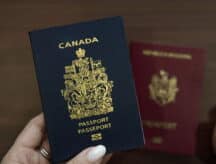Nova Scotia sets stage for economic recovery with increased levels of immigration
Nova Scotia approved an increasing number of immigrants in 2020, paving the way for economic recovery over the next few years.
A total of 3,517 immigration candidates were approved last year, many of whom are either skilled in essential services, such as healthcare workers, or already living in Canada. Those who currently live abroad are expected to arrive in Canada once coronavirus-related travel restrictions are eased.
The focus on essential services this year means that many healthcare workers were retained in the province, such as care assistants, nurses and physicians.
The immigration levels were lower in 2020 compared to 2019 due to the pandemic. Despite this, Nova Scotia continued to process applications through the Atlantic Immigration Program (AIP) and the Nova Scotia Nominee Program (NSNP). The province’s immigration minister Lena Diab recognizes the crucial role that continued immigration will play in Nova Scotia’s post-pandemic economic recovery and growth.
Find out if you’re eligible for Canadian immigration
“Immigration will play an important role in our economy as we recover from this pandemic,” Diab said in a media release. “We will continue to work with our stakeholders to identify labour needs in key essential service sectors and employers who need specialized skills and talent to create economic growth.”
The province seems to focus on attracting foreign talent with specialized skills or occupations that match identified labour shortages. In addition, the province seeks to retain international students after they graduate. Last year, 1,018 graduates chose to apply to stay in Nova Scotia after graduation, a significant increase from 2014, when only 35 graduates remained in the province.
How to immigrate to Nova Scotia
Those who are interested in moving to Nova Scotia permanently have two options to choose from: the Atlantic Immigration Program (AIP), and the Nova Scotia Nominee Program (NSNP).
The AIP allows employers in Atlantic Canada to hire foreign nationals for occupations that they were unable to fill. Employers do not need to obtain a Labour Market Impact Assessment (LMIA). Atlantic Canada consists of four provinces: Nova Scotia, New Brunswick, Newfoundland and Labrador and Prince Edward Island.
Candidates arriving in Canada under the AIP must have a job offer from a designated employer and must have an individualized settlement plan. Candidates who accept a job offer from an employer in Atlantic Canada will be connected to a designated settlement service provider by their employer to develop their individualized settlement plan.
- Nova Scotia Experience: Express Entry, for Express Entry candidates who worked in Nova Scotia for at least one year;
- Nova Scotia Labour Market Priorities, for Express Entry candidates who meet specific labour market needs;
- Nova Scotia Labour Market Priorities for Physicians, for Express Entry candidates who have a job offer as a family physician or specialist physician;
- Physician Stream, for physicians who have a job offer in Nova Scotia and are not in the Express Entry system;
- Skilled Worker Stream, for skilled workers who have received a job offer in the province;
- Occupation In Demand Stream, for workers with a job offer in an occupation that is deemed “in-demand;”
- Entrepreneur Stream, is for individuals who wish to start a business in the province; and
- International Graduate Entrepreneur Stream, for international graduates who wish to start a business in the province.
Find out if you’re eligible for Canadian immigration
© CIC News All Rights Reserved. Visit CanadaVisa.com to discover your Canadian immigration options.
- Do you need Canadian immigration assistance? Contact the Contact Cohen Immigration Law firm by completing our form
- Send us your feedback or your non-legal assistance questions by emailing us at media@canadavisa.com







